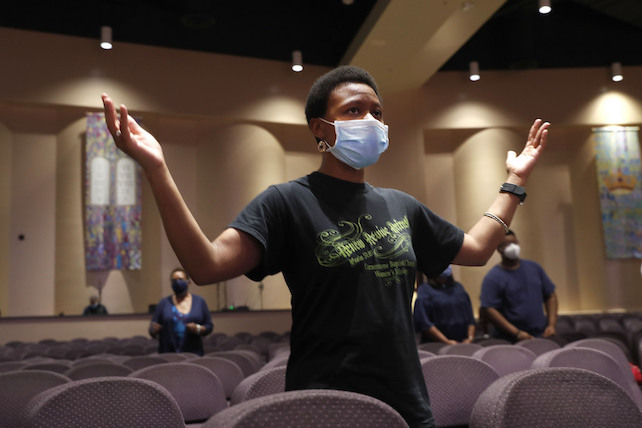UPDATED May 4, 2021:
(RNS) — The party is over.
Former Liberty University President Jerry Falwell Jr. has reportedly canceled a graduation party he planned to host Saturday (May 8) on his family farm, which, during a spontaneous appearance at an event last week, he called the “real Liberty graduation.”
The cancelation comes after Falwell reportedly was hospitalized over the weekend for testing related to the blood clots in his lungs he was diagnosed with last year.
“As a result, we regrettably must cancel the picnic this weekend,” he said in a statement his wife Becki Falwell provided Monday to local Lynchburg, Virginia, news station ABC13 News.
Falwell had announced the party onstage at an outdoor comedy show that was attended by Liberty students.
He later told Religion News Service he was joking about the party being the “real” Liberty graduation and called the event “my way of saying thank you” to students at the evangelical Christian school, who, he said, have supported him through the past year.
He did not comment on plans for the party at the time, though his latest statement characterizes it as a picnic.
Falwell resigned last year from Liberty — which was founded by his late father, the Rev. Jerry Falwell Sr. — as he weathered a series of controversies, including a questionable post on social media he claimed was “meant in good fun.” He also faced allegations that he and Becki Falwell had a yearslong sexual relationship with a business associate, which the Falwells have disputed.
He told RNS last week the party was on as long as his health didn’t take a turn, noting he has been receiving treatment for blood clots in his lungs, something he has said his mother also battled.
But, his statement to ABC13 News reads, “Unfortunately, this weekend I encountered another bout of symptoms resulting from the respiratory emboli that were first diagnosed last year. For the fourth time this year I was admitted to the hospital for a series of tests to address my labored breathing and other effects of the emboli.”
Falwell said in the statement that canceling the party was “a major disappointment to us since we wanted to celebrate the success of the graduating students and show them our appreciation.
“To them, our entire family extends our sincere congratulations and fond farewell,” he added.
________________________
ChurchLeaders original article written on May 3, 2021 below.
(RNS) — Former Liberty University President Jerry Falwell Jr., who left the school last year in the wake of multiple scandals, made an appearance at a gathering that included students over the weekend where he invited attendees to the “real Liberty graduation” at his own house next month.
Religion News Service has obtained footage of the moment that matches a shorter video circulating on Twitter claiming to show Falwell’s invitation.
In the videos, Falwell, who resigned in 2020 as president and chancellor of the evangelical school, can be seen standing on an outdoor stage beneath handmade signs that include a cross, as a crowd attending what several people have identified as a comedy show look on. Holding a microphone, Falwell invites seniors to an event at “our farm” on May 8, saying, “We’re going to have the real Liberty graduation.”
“If you’re not a senior but you’re dating one, you can come, too,” he added, according to the video obtained by RNS.
In the longer video, Falwell said he and his wife, Becki Falwell, were out to dinner when they heard from their daughter, a junior at Liberty, that she was at the show. He had only come to extend the invitation, he said.
He noted his daughter was “probably so pissed at me right now” and encouraged students to spread the word “as fast as you can” about the event on social media.
“We gotta move quickly,” he said.
Reached by RNS on Friday (April 30), Falwell said he was joking about the party being the “real” Liberty graduation. The planned event at his 500-acre farm, where his family has lived for 33 years, is “my way of saying thank you” to the students, who he said have supported him through the past year of controversy.
“I just want to thank the students because they’ve shown me so much love through all this ordeal. Everywhere I go, they’re so forgiving. They’re so loving. And I want to reciprocate by having them out to my farm,” he said.
He said the party is on as long as his health doesn’t take a turn, noting he has been receiving treatment for blood clots, something his mother also battled. He did not comment on plans for the party.
Asked about those who have questioned whether it is appropriate for the former president of the university to host such a party, Falwell said, “I live right here, and I’ve got a big farm, and I got a bunch of students that I love and that love me, and I’m going to do it.
“I don’t care whether anybody likes it or not,” he said, laughing.
The reaction from the student body is not immediately clear. In one video, an onlooker can be heard whispering as Falwell makes the announcement, saying, “Let’s go.”
But Save71, an alumni group that has been critical of the former university president, expressed concerns about Falwell’s behavior, given past scandals involving him and his wife.
“Leaders of a university are obligated to do their best to protect students, but Liberty’s leaders have not investigated or even acknowledged allegations of sexually predatory behavior by the Falwells,” said Dustin Wahl, cofounder of Save71.
“Now Jerry Falwell Jr. is taking advantage of their inaction.”
Liberty University officials could not immediately be reached for comment.
Falwell has appeared at some recent events on Liberty’s campus, although he has since tweeted that he and Becki Falwell have been banned from campus.
He also has reappeared on social media recently after a hiatus.
Falwell had been silent while receiving medical treatment for his blood clots, he told RNS, which has included blood thinners and a trip to a New York University hospital at the advice of a doctor he said was introduced to him by conservative talk show host Sean Hannity.
But, he said, “I’m slowly getting better, and I’m ready to fight again.”
Falwell caused controversy last August by briefly posting a photo on Instagram of himself with his arm around a woman who is not his wife, their pants unzipped and midriffs bared. Though Falwell said the photo was meant “in good fun” and was taken at a costume party while on vacation, he soon took an indefinite leave of absence and later resigned.
He has faced allegations that he and Becki Falwell had a yearslong sexual relationship with a business associate, which the Falwells have disputed.
Politico also has reported allegations by a former Liberty student, who claimed he had a sexual encounter with Becki Falwell — who the student described as “the aggressor” after she allegedly continued to pursue him later — while staying at the Falwell home after band practice with the Falwells’ eldest son in 2008. Jerry and Becki Falwell responded at the time by calling the allegations “false and mean spirited lies.”
Jerry Falwell Jr., is currently being sued by the school he once ran, with Liberty’s lawyers demanding $10 million from him, citing conspiracy and breach of contract involving the recent scandals.
Falwell told RNS it was “evil what some of these people at Liberty are doing just to try to grab power.” At age 59, he said, he’s done his work and is fine if that happens.
“But the world needs to know I didn’t do anything wrong. The world needs to know it’s just a power grab,” he said.
“And I’ll probably tell that to the students.”
This article originally appeared here.













